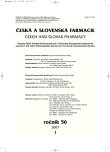-
Medical journals
- Career
Deep vein thromboembolism in malignant diseases
Authors: M. Zemková 1,2; Meyboom R. H. B. 1,3; M. Blažek 4; J. Kotlářová 2; J. Vlček 2; L. Jebavý 4,5
Authors‘ workplace: Uppsala Monitoring Centre, WHO Collaborating Centre for International Drug Monitoring Uppsala, Sweden 1; Department of Social and Clinical Pharmacy, School of Pharmacy Hradec Králové, Charles University Prague, Czech Republic 2; Department of Pharmacoepidemiology and Pharmacotherapy, Utrecht Institute for Pharmaceutical Sciences, Utrecht, the Netherlands 3; Department of Clinical Haematology of the Second Internal Clinic in the University Hospital and Medical Faculty of Charles University Hradec Králové, Czech Republic 4; Department of Field Internal Medicine, Faculty of Military Health Sciences, University of Defence Hradec Králové, Czech Republic 5
Published in: Čes. slov. Farm., 2007; 56, 5-10
Category: Review Articles
Overview
Tumourous diseases are associated with haemorrhagic as well as thrombotic complications. Trousseau described in 1865 a mutual association between tumourous diseases and venous thromboembolism. As many as 15–20 % patients with venous thromboembolism have an undetected malignity, which equals a prevalence of 2–3 % in the population. From this ensues the relative risk of a newly diagnosed malignity which is higher during the first year after venous thromboembolism. Migrating thrombophlebitis is a relatively specific sign in tumours, in particular in pancreatic tumours. In the pathogenesis of venous thromboembolisms in tumourous diseases, the following factors play a significant part: elevated coagulation parameters, reduced fibrinolysis, frequent immobilization, surgical operations in the case history, chemotherapy, hormonal therapy and central venous catheters. Conventional long term management of VTE involves the use of vitamin K antagonists, such as warfarin, to reduce the risk of recurrence. Recent evidence-based approach in long term management of VTE in patients with tumorous disease shows that the use of LMWH offers an effective alternative to VKAs with higher efficacy, without a significantly increased risk of bleeding, and without the need for regular laboratory monitoring.
Key words:
haemostasis – deep venous thrombosis – tumourous diseases – pathogenesis – treatment – unfractionated/low molecular weight heparin – warfarin
Labels
Pharmacy Clinical pharmacology
Article was published inCzech and Slovak Pharmacy

2007 Issue 1-
All articles in this issue
- Deep vein thromboembolism in malignant diseases
- Extrusion/spheronization: an important method for the production of the pellet dosage form
- The influence of the extrusion die on pellet characteristics
- Genista tinctoria in vitro
- Constituents of Lilium candidum L. and their antioxidative activity
- Prescription of hypolipidemic agents in 2001–2004
- Consumption of old and new antiepileptic drugs in the Czech Republic in 1999–2004
- Analysis of supplying situation in pharmacies I. Supply with medicaments and health appliances from the viewpoint of pharmacies and distributors
- Czech and Slovak Pharmacy
- Journal archive
- Current issue
- Online only
- About the journal
Most read in this issue- Extrusion/spheronization: an important method for the production of the pellet dosage form
- The influence of the extrusion die on pellet characteristics
- Deep vein thromboembolism in malignant diseases
- Constituents of Lilium candidum L. and their antioxidative activity
Login#ADS_BOTTOM_SCRIPTS#Forgotten passwordEnter the email address that you registered with. We will send you instructions on how to set a new password.
- Career

